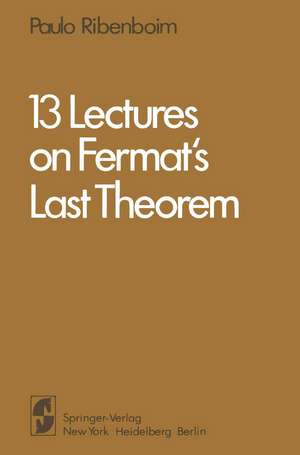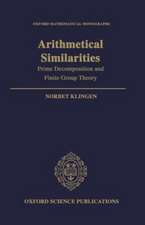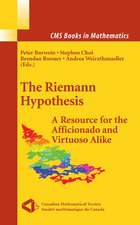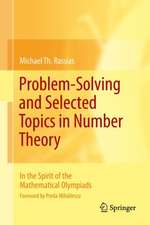13 Lectures on Fermat's Last Theorem
Autor Paulo Ribenboimen Limba Engleză Hardback – 18 dec 1979
| Toate formatele și edițiile | Preț | Express |
|---|---|---|
| Paperback (1) | 389.88 lei 6-8 săpt. | |
| Springer – dec 2010 | 389.88 lei 6-8 săpt. | |
| Hardback (1) | 397.59 lei 6-8 săpt. | |
| Springer – 18 dec 1979 | 397.59 lei 6-8 săpt. |
Preț: 397.59 lei
Nou
Puncte Express: 596
Preț estimativ în valută:
76.09€ • 78.60$ • 63.32£
76.09€ • 78.60$ • 63.32£
Carte tipărită la comandă
Livrare economică 25 martie-08 aprilie
Preluare comenzi: 021 569.72.76
Specificații
ISBN-13: 9780387904320
ISBN-10: 0387904328
Pagini: 302
Ilustrații: XVI, 302 p.
Dimensiuni: 156 x 234 x 22 mm
Greutate: 0.64 kg
Ediția:1979
Editura: Springer
Colecția Springer
Locul publicării:New York, NY, United States
ISBN-10: 0387904328
Pagini: 302
Ilustrații: XVI, 302 p.
Dimensiuni: 156 x 234 x 22 mm
Greutate: 0.64 kg
Ediția:1979
Editura: Springer
Colecția Springer
Locul publicării:New York, NY, United States
Public țintă
ResearchCuprins
Lecture I The Early History of Fermat’s Last Theorem.- 1 The Problem.- 2 Early Attempts.- 3 Kummer’s Monumental Theorem.- 4 Regular Primes.- 5 Kummer’s Work on Irregular Prime Exponents.- 6 Other Relevant Results.- 7 The Golden Medal and the Wolfskehl Prize.- Lecture II Recent Results.- 1 Stating the Results.- 2 Explanations.- Lecture III B.K. = Before Kummer.- 1 The Pythagorean Equation.- 2 The Biquadratic Equation.- 3 The Cubic Equation.- 4 The Quintic Equation.- 5 Fermat’s Equation of Degree Seven.- Lecture IV The Naïve Approach.- 1 The Relations of Barlow and Abel.- 2 Sophie Germain.- 3 Congruences.- 4 Wendt’s Theorem.- 5 Abel’s Conjecture.- 6 Fermat’s Equation with Even Exponent.- 7 Odds and Ends.- Lecture V Kummer’s Monument.- 1 A Justification of Kummer’s Method.- 2 Basic Facts about the Arithmetic of Cyclotomic Fields.- 3 Kummer’s Main Theorem.- Lecture VI Regular Primes.- 1 The Class Number of Cyclotomic Fields.- 2 Bernoulli Numbers and Kummer’s Regularity Criterion.- 3 Various Arithmetic Properties of Bernoulli Numbers.- 4 The Abundance of Irregular Primes.- 5 Computation of Irregular Primes.- Lecture VII Kummer Exits.- 1 The Periods of the Cyclotomic Equation.- 2 The Jacobi Cyclotomic Function.- 3 On the Generation of the Class Group of the Cyclotomic Field.- 4 Kummer’s Congruences.- 5 Kummer’s Theorem for a Class of Irregular Primes.- 6 Computations of the Class Number.- Lecture VIII After Kummer, a New Light.- 1 The Congruences of Mirimanoff.- 2 The Theorem of Krasner.- 3 The Theorems of Wieferich and Mirimanoff.- 4 Fermat’s Theorem and the Mersenne Primes.- 5 Summation Criteria.- 6 Fermat Quotient Criteria.- Lecture IX The Power of Class Field Theory.- 1 The Power Residue Symbol.- 2 Kummer Extensions.- 3 The Main Theorems ofFurtwängler.- 4 The Method of Singular Integers.- 5 Hasse.- 6 The p-Rank of the Class Group of the Cyclotomic Field.- 7 Criteria of p-Divisibility of the Class Number.- 8 Properly and Improperly Irregular Cyclotomic Fields.- Lecture X Fresh Efforts.- 1 Fermat’s Last Theorem Is True for Every Prime Exponent Less Than 125000.- 2 Euler Numbers and Fermat’s Theorem.- 3 The First Case Is True for Infinitely Many Pairwise Relatively Prime Exponents.- 4 Connections between Elliptic Curves and Fermat’s Theorem.- 5 Iwasawa’s Theory.- 6 The Fermat Function Field.- 7 Mordell’s Conjecture.- 8 The Logicians.- Lecture XI Estimates.- 1 Elementary (and Not So Elementary) Estimates.- 2 Estimates Based on the Criteria Involving Fermat Quotients.- 3 Thue, Roth, Siegel and Baker.- 4 Applications of the New Methods.- Lecture XII Fermat’s Congruence.- 1 Fermat’s Theorem over Prime Fields.- 2 The Local Fermat’s Theorem.- 3 The Problem Modulo a Prime-Power.- Lecture XIII Variations and Fugue on a Theme.- 1 Variation I (In the Tone of Polynomial Functions).- 2 Variation II (In the Tone of Entire Functions).- 3 Variation III (In the Theta Tone).- 4 Variation IV (In the Tone of Differential Equations).- 5 Variation V (Giocoso).- 6 Variation VI (In the Negative Tone).- 7 Variation VII (In the Ordinal Tone).- 8 Variation VIII (In a Nonassociative Tone).- 9 Variation IX (In the Matrix Tone).- 10 Fugue (In the Quadratic Tone).- Epilogue.- Index of Names.


















